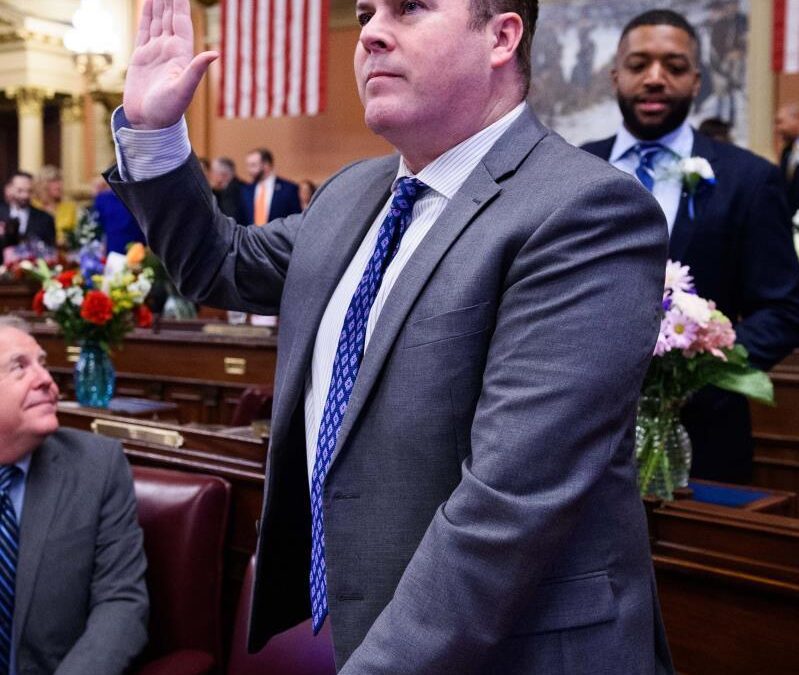
Abortion rights activists protest outside of the U.S. Supreme Court, Wednesday, May 11, 2022 in Washington. A draft opinion suggests the U.S. Supreme Court could be poised to overturn the landmark 1973 Roe v. Wade case that legalized abortion nationwide, according to a Politico report. (AP Photo/Jose Luis Magana)
The bill’s failure to advance underscores how Democrats are severely limited in what they can achieve with a narrow Senate majority.
As expected, the US Senate voted 49-51 against invoking cloture on a bill that would have protected abortion access nationwide.
Democrats needed 60 votes in favor of cloture to break the Republican filibuster and force a vote on the bill, a threshold they knew they would not reach when they moved forward with holding the vote.
The bill’s failure to advance underscores how Democrats are severely limited in what they can achieve with a narrow Senate majority. Holding the vote offered Democrats a chance to spotlight the issue and criticize Republican resistance to passage of the legislation.
The Vote
Pennsylvania’s two senators split their vote, with Democratic Sen. Bob Casey voting in favor and Republican Sen. Pat Toomey voting against.
Democrats were pushing the bill in an effort to protect reproductive rights after a leaked draft opinion of a Supreme Court ruling shows the high court is poised to overturn Roe v. Wade.
The bill failed to get majority support in the Senate in February, when Casey was one of just two sitting Democratic senators to not co-sponsor the bill. He announced on Tuesday that he would now support the bill, saying “the circumstances around the entire debate on abortion have changed.”
What’s in the Bill?
The Women’s Health Protection Act would codify Roe v. Wade into federal law, meaning it would be much harder for the Supreme Court to overturn the landmark decision.
The legislation would establish that health care providers have rights to provide abortion services and that patients have a right to receive abortions.
The bill would also end certain state laws that have chipped away at abortion rights, banning medically unnecessary restrictions that block access to safe and accessible abortions. The court has allowed states to regulate but not ban abortion before the point of viability, around 24 weeks, resulting in a variety of state laws and restrictions that abortion-rights supporters oppose.
The bill would end bans earlier than 24 weeks, in addition to any restrictions that do not make exceptions for the patient’s health or life. It would also stop states from requiring providers share “medically inaccurate” information, or from requiring additional tests or waiting periods, aimed at dissuading a patient from having an abortion.
Pennsylvania’s current law on abortion allows for the termination of a pregnancy up to 24 weeks. The majority-GOP state Legislature has repeatedly pushed legislation that would limit access to abortion care. Gov. Tom Wolf’s veto pen has been the last line of defense in the fight for reproductive rights in the commonwealth.
What Happens Next?
Democrats have few options to block the eventual Supreme Court ruling overturning Roe v. Wade.
Democratic leaders have signaled that they instead intend to take the fight to voters ahead of this year’s midterms.
“We’ve got to win elections,” Sen. Chris Murphy, (D-Conn), said prior to Wednesday’s vote..
In Pennsylvania, the governor’s seat is up for grabs as is Toomey’s position in the Senate. Both races will be key to determining the future of abortion rights in the commonwealth and across the nation.
Information from the Associated Press was used in this report.
Politics

Malcolm Kenyatta makes history after winning primary for Pa. Auditor General
State Rep. Malcolm Kenyatta, who was first elected to the state House in 2018, won the Democratic nomination for Pa. Auditor General and will...

Biden administration bans noncompete clauses for workers
The Federal Trade Commission (FTC) voted on Tuesday to ban noncompete agreements—those pesky clauses that employers often force their workers to...

Philadelphia DA cancels arrest warrant for state Rep. Kevin Boyle on eve of Pa. primary
Philadelphia District Attorney Larry Krasner said a detective had sought the warrant against Boyle, a Democrat whose district includes a section of...
Local News

What do you know about Wawa? 7 fun facts about Pennsylvania’s beloved convenience store
Wawa has 60 years of Pennsylvania roots, and today the commonwealth’s largest private company has more than 1,000 locations along the east coast....

Conjoined twins from Berks County die at age 62
Conjoined twins Lori and George Schappell, who pursued separate careers, interests and relationships during lives that defied medical expectations,...







